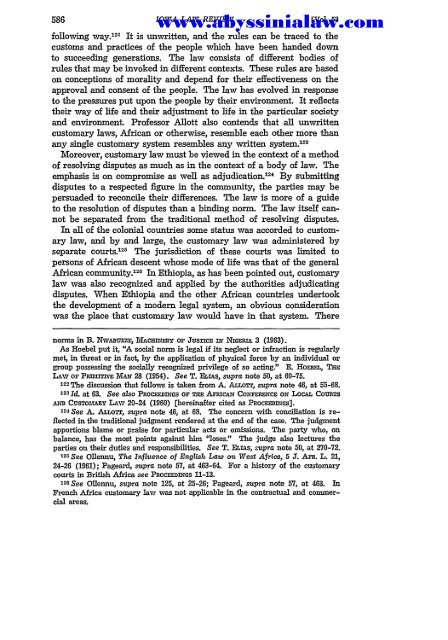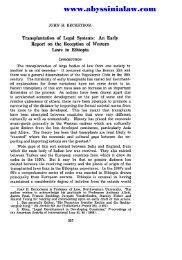You also want an ePaper? Increase the reach of your titles
YUMPU automatically turns print PDFs into web optimized ePapers that Google loves.
IOWA LAW REVIEW<br />
[Vol 53<br />
www.abyssinialaw.com<br />
following way. 1 - 2 It is unwritten, and the rules can be traced to the<br />
customs and practices of the people which have been handed down<br />
to succeeding generations. The law consists of different bodies of<br />
rules that may be invoked in different contexts. These rules are based<br />
on conceptions of morality and depend for their effectiveness on the<br />
approval and consent of the people. The law has evolved in response<br />
to the pressures put upon the people by their environment. It reflects<br />
their way of life and their adjustment to life in the particular society<br />
and environment. Professor Allott also contends that all unwritten<br />
customary laws, African or otherwise, resemble each other more than<br />
any single customary system resembles any written system. 23<br />
Moreover, customary law must be viewed in the context of a method<br />
of resolving disputes as much as in the context of a body of law. The<br />
emphasis is on compromise as well as adjudication. 124 By submitting<br />
disputes to a respected figure in the community, the parties may be<br />
persuaded to reconcile their differences. The law is more of a guide<br />
to the resolution of disputes than a binding norm. The law itself cannot<br />
be separated from the traditional method of resolving disputes.<br />
In all of the colonial countries some status was accorded to customary<br />
law, and by and large, the customary law was administered by<br />
separate courts. 125 The jurisdiction of these courts was limited to<br />
persons of African descent whose mode of life was that of the general<br />
African community. 1 26 In Ethiopia, as has been pointed out, customary<br />
law was also recognized and applied by the authorities adjudicating<br />
disputes. When Ethiopia and the other African countries undertook<br />
the development of a modern legal system, an obvious consideration<br />
was the place that customary law would have in that system. There<br />
norms in B. NwNABIEZE, MACHINERY oF JusTIcE nr NiazaEa 3 (1963).<br />
As Hoebel put it, "A social norm is legal if its neglect or infraction is regularly<br />
met, in threat or in fact, by the application of physical force by an individual or<br />
group possessing the socially recognized privilege of so acting." E. HoEBEL, THE<br />
LAW OF PRniTrE MAN 28 (1954). See T. ETs, supra note 50, at 60-75.<br />
122 The discussion that follows is taken from A. AxLoTr, supra note 46, at 55-68.<br />
123 Id. at 63. See also PROCEmNGS OF THE AFRIcaN CONvzRENCE ON LOCAL CoUsTS<br />
mm Cusosmy LAw 20-24 (1960) [hereinafter cited as PsoCEEDiNGs].<br />
124 See A. ALLoiT, supra note 46, at 68. The concern with conciliation is reflected<br />
in the traditional judgment rendered at the end of the case. The judgment<br />
apportions blame or praise for particular acts or omissions. The party who, on<br />
balance, has the most points against him "loses." The judge also lectures the<br />
parties on their duties and responsibilities. See T. ELIAS, supra note 50, at 270-72.<br />
1 25 See Ollennu, The Influence of English <strong>Law</strong> on West Africa, 5 J. AXE. L. 21,<br />
24-26 (1961); Pageard, supra note 57, at 463-64. For a history of the customary<br />
courts in British Africa see PROCEEDINGS 11-13.<br />
126 See Ollennu, supra note 125, at 25-26; Pageard, supra note 57, at 463. In<br />
French Africa customary law was not applicable in the contractual and commercial<br />
areas.





